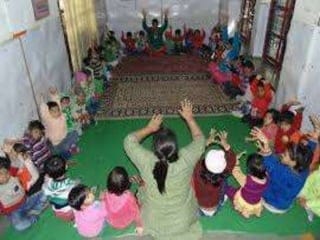Socialisation of child
"Socialisation is the process by which children are prepared to become successful members of society. This requires the learning of skills, behaviour patterns, ideas, and values needed for competent functioning in the society in which a child is growing up. More broadly, socialisation is a process by which culture is transmitted or reproduced in each new generation. Parents hope to instill cultural continuity and competence in their children. Socialisation also includes inadvertent outcomes, such as when harsh parental practices and poor home environments send children on negative trajectories of poor achievement and antisocial behaviour.
Primary and secondary socialisation are two forms of socialisation that are particularly important for children.There are many different forms of socialisation, but these two types are particularly important for children.
- Primary socialisation :- this is the acceptance and learning of a set of norms and values established through the process of socialisation. Primary socialisation for a child is very important because it sets the groundwork for all future socialisation. Primary socialisation occurs when a child learns the attitudes, values, and actions appropriate to individuals as members of a particular culture. It is mainly influenced by the immediate family and friends. For example if a child saw his or her mother expressing a discriminatory opinion about a minority group, then that child may think this behaviour is acceptable and could continue to have this opinion about minority groups.
- Secondary socialisation :- refers to the process of learning what is the appropriate behaviour as a member of a smaller group within the larger society. Basically, it is the behavioural patterns reinforced by socialising agents of society. Secondary socialisation takes place outside the home. It is where children and adults learn how to act in a way that is appropriate for the situations they are in. Schools require very different behaviour from the home, and children must act according to new rules. New teachers have to act in a way that is different from pupils and learn the new rules from people around them. Secondary socialisation is usually associated with teenagers and adults, and involves smaller changes than those occurring in primary socialisation.
How important is socialisation for children?
Socialisation in early childhood education is of fundamental importance for the evolution of the child in the face of different everyday situations.
We often imagine that children are beings who do not know how to interact, however, they are in constant learning and perform their interactions in the most diverse ways.
Watching children socialise, whether at school or in another environment where they feel safe to do so, allows the adults around them to guide their behaviour to help overcome their difficulties.
The importance of the school in this process grants autonomy to the little ones, and they start to see the world as a wide space of opportunities to interact with other people.
They begin to recognise when there is a real incentive to socialise at this stage of life. The family’s presence as a supporter of the child in the school environment generates a significant improvement in learning.
The importance of socialisation for children implies the development of skills that may be the most diverse and necessary for the future of small explorers.
Below is a short list of skills acquired from socialisation:
- Emotional skills : when the child is in the school socialisation process, he/she will need to share moments, and share physical space, in addition to making concessions to his/her colleagues who will end up helping in the formation as a person of the little ones.
- Language skills : during the socialisation process, the child will develop orality and at each moment will learn to express his/her feelings through oral communication.
- Math skills : When we talk about math skills that children develop through socialisation, we must think about the exploration they will make of space, discovering shapes, playing, and learning with the objects that make up the interaction space.
.jpeg)


.jpeg)
Comments
Post a Comment